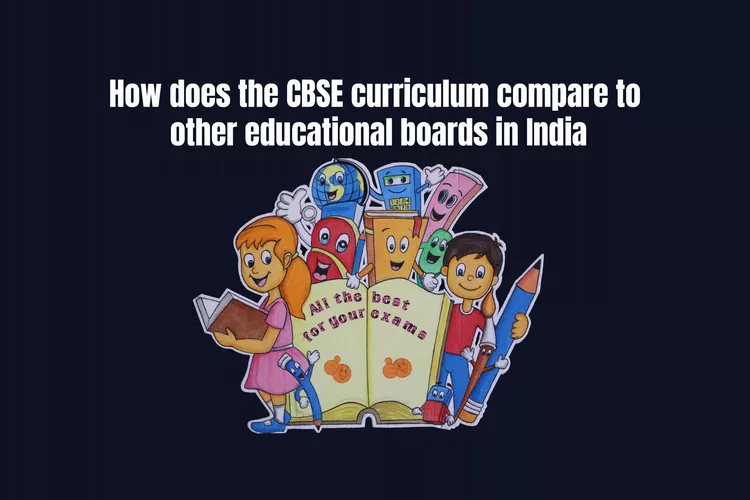The Indian academic system presents a diverse array of curriculums for students to choose from – CBSE, ICSE, and state boards each hold their own unique traits and teaching approaches. The Central Board of Secondary Education, also known as CBSE, is a widely respected and highly prominent educational board in India. Over 24,000 schools are affiliated with the CBSE board with an ample number of students across the country. The CBSE curriculum is constructed to provide students with a well-rounded education that encompasses a broad range of subjects.
With so many different educational boards, it can be confusing to understand the differences and similarities between CBSE, ICSE, and state boards. To make informed decisions, it’s necessary for both parents and students to comprehend the comparison between these boards. This article will delve into the CBSE curriculum and its comparison with ICSE and state boards in India.
1) Syllabus and Curriculum
The CBSE educational approach prioritises a comprehensive education that encompasses a broad spectrum of subjects like science, math, social science, and the arts. The curriculum undergoes regular revisions to stay current and relevant in the ever-evolving education realm.
In comparison, the ICSE curriculum is more demanding, with a stronger emphasis on building a solid foundation in core subjects such as math, science, and English. Additionally, it covers subjects like history, geography, and economics.
Meanwhile, the state boards offer a more adaptable curriculum, providing a wider range of subjects compared to CBSE and ICSE. The state board curriculum also places greater emphasis on meeting the specific needs and demands of the local student within a State.
2) Examination System
Every year, the Central Board of Secondary Education (CBSE) conducts a centralised examination system in the months of March and April. The results of CBSE exams are declared in May, with the question papers covering the curriculum taught throughout the academic year. On the other hand, the Indian Certificate of Secondary Education (ICSE) operates a more decentralised system, with exams conducted at the end of each term and results declared promptly. Both CBSE and ICSE aim to provide students with regular feedback on their performance throughout the year. The examination systems of state boards vary in nature with some States conducting centralised exams while others adopting a decentralised approach.
3) Evaluation System
The CBSE board implements a grading methodology that evaluates the proficiency of students based on their final exam scores. Both CBSE and ICSE boards have a well-rounded evaluation process that summarises the student’s entire academic year performance. This includes internal assessments, term exams, and of course, the final examination. Every state board has its own distinctive evaluation system, some prioritising internal assessments while others lay emphasis on the final exam. The method of evaluation adopted by state boards also differs from one state to another.
4) Emphasis on Practical Work
The CBSE curriculum places a heavy focus on hands-on learning and practical application, aiming to bridge the gap between classroom theories and real-life situations. With a keen eye towards technology and innovation, CBSE prioritises promoting a scientific mindset and fostering students’ ability to utilise technology for the betterment of society.
In contrast, the ICSE curriculum places more weight on acquiring a strong foundation in core subjects through theoretical learning, before delving into practical work. Meanwhile, state boards offer a well-rounded approach, balancing theoretical and practical learning.
5) Focus on Sports and Extracurricular Activities
The CBSE education system prioritises sports and extracurricular pursuits by offering a vast array of options for students to choose from. This encourages students to maintain a healthy balance between their physical and mental health, as well as provides them with the chance to refine their talents and hobbies. Meanwhile, the ICSE curriculum places a considerable emphasis on extracurricular activities as well, with a specific focus on cultural pursuits such as music, art and more. Various state boards also emphasise the significance of extracurricular activities, with the specific focus changing from state to state.
6) Emphasis on Vocational Education
The CBSE curriculum is crafted with the aim of offering pupils an extensive range of academic and professional options, including vocation-based education. Thus, learners are given the liberty to concentrate on disciplines such as medicine, engineering, or commerce apart from conventional school subjects. The CBSE curriculum equips students with the essential skills and know-how to excel in their desired profession by providing them with ample opportunities to delve into these fields. On the other hand, the ICSE curriculum doesn’t particularly emphasise vocational education, but it comprises subjects like Home Science and Art Education that give students hands-on skills and practical knowledge that they can apply in real-world scenarios.
Understanding the details of the CBSE curriculum is important for parents navigating the various landscape of Indian education. CBSE focuses on a broad education with real-life uses. But, it’s also crucial to compare this with the more focused ICSE and flexible state boards. By understanding the differences in what is taught, how exams are done, and what’s emphasized, parents can choose the best fit for their kids. This helps make sure their kids get an education that suits their own needs and dreams.




